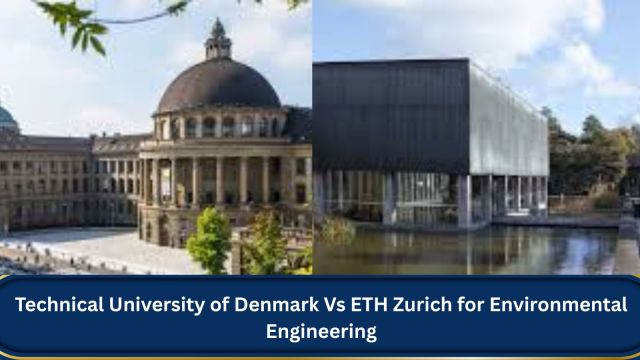Technical University of Denmark Vs ETH Zurich for Environmental Engineering: Which one will you choose?
Both universities offer world-class education at a fraction of US costs, with DTU charging no tuition fees for EU students and reasonable fees for international students, while ETH Zurich maintains affordable tuition compared to American counterparts.
 Both universities offer world-class programmes, but understanding their distinct approaches can help prospective students make an informed choice. (Image: Official websites)
Both universities offer world-class programmes, but understanding their distinct approaches can help prospective students make an informed choice. (Image: Official websites)–Akshita Reddy
When pursuing advanced studies in Environmental Engineering, two institutions consistently rank among Europe: the Technical University of Denmark (DTU) and ETH Zurich. Both universities offer world-class programmes, but understanding their distinct approaches can help prospective students make an informed choice.
Academic Excellence and Rankings
ETH Zurich holds a slight edge in global rankings, consistently placing in the top 10 worldwide and ranking 1 in continental Europe. The university’s Environmental Sciences and Engineering department is renowned for its cutting-edge research in climate modeling, sustainable materials, and environmental systems analysis. ETH’s rigorous academic culture emphasizes theoretical depth combined with practical application.
On the other hand DTU, while ranking slightly lower globally, excels specifically in environmental engineering applications. The university’s strong industry connections and focus on sustainability solutions have made it a leader in areas like renewable energy integration, water treatment technologies, and circular economy principles. DTU’s approach is distinctly problem-solving oriented, preparing students for immediate industry impact.
Location and Living Experience
Switzerland offers an exceptional quality of life but comes with significantly higher living costs. Zurich’s central European location provides easy access to diverse cultural experiences and outdoor activities. However, students should budget approximately €20,000-25,000 annually or living expenses.
Denmark provides a more affordable alternative while maintaining high living standards. Copenhagen’s bike-friendly culture and strong environmental consciousness create an inspiring atmosphere for environmental engineering students. Living costs are roughly 30-40% lower than Zurich.
Program Structure and Specializations
ETH Zurich’s programme offers broad foundational knowledge with opportunities to specialize in atmospheric sciences, soil and groundwater protection, or urban water management. The curriculum emphasizes mathematical modeling and system analysis, producing graduates well- equipped for research careers or highly technical roles.
DTU’s programme on the other hand, takes a more application-focused approach. Students engage with real-world projects from semester one, working on challenges like urban pollution control, industrial waste management, and sustainable infrastructure design. The programme’s modular structure allows for significant customization, enabling students to tailor their studies to specific career goals.
Research Opportunities and Innovation
Both institutions provide excellent research opportunities, but with different strengths. ETH Zurich excels in fundamental research, with students often contributing to breakthrough studies in climate science, environmental modeling, and advanced materials. The university’s substantial research funding enables access to state-of-the-art facilities and international collaborations.
While, DTU’s research philosophy centers on applied innovation with immediate societal impact. Students frequently work on projects funded by Danish and European environmental agencies, focusing on practical solutions for waste management, renewable energy systems, and sustainable urban planning. This approach often leads to patent applications and startup opportunities.
Industry Connections and Career Prospects
ETH Zurich’s prestige opens doors to positions at leading multinational corporations, international organizations, and top-tier consulting firms. Graduates often pursue careers with companies like Nestlé, ABB, or international bodies such as the UN Environment Programme. The theoretical rigor of ETH’s program particularly appeals to employers seeking analytical and research capabilities.
DTU’s strong industry partnerships provide students with extensive internship opportunities and direct pathways to employment in Scandinavia’s thriving environmental sector. Danish companies like Ørsted, COWI, and Ramboll regularly recruit DTU graduates. The programme’s practical orientation produces professionals ready to tackle immediate environmental challenges.
Making Your Choice
Choose ETH Zurich if you are drawn to theoretical depth, cutting-edge research, and global prestige. The program suits students planning research careers or roles requiring strong analytical skills.
Select DTU if you prefer hands-on learning, immediate practical application, and strong industry connections. This path benefits students eager to solve real-world environmental challenges and enter the workforce quickly.
The European Advantage
With increasingly competitive and expensive graduate programmes in the US, European institutions like DTU and ETH Zurich become even more attractive alternatives. Both universities offer world-class education at a fraction of US costs, with DTU charging no tuition fees for EU students and reasonable fees for international students, while ETH Zurich maintains affordable tuition compared to American counterparts.
Keep in mind that proficiency in the local language is often a prerequisite to complete courses at many European universities. While Master’s programmes at both ETH Zurich and DTU are widely available in English, Bachelor’s programs are less commonly offered.
For instance, DTU currently provides just one full English-taught BSc programme—in General Engineering. At ETH, all Bachelor’s programs begin in German, though some individual courses are available in English.
- 01
- 02
- 03
- 04
- 05































